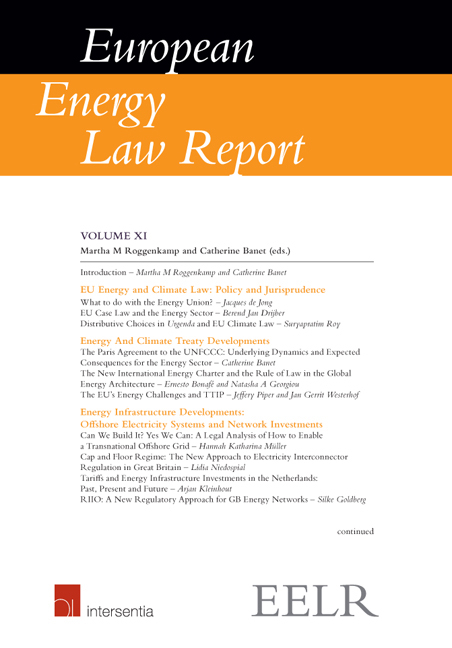Book contents
- Frontmatter
- Editorial
- Contents
- List of Abbreviations
- List of Contributors
- Introduction
- Part I EU Energy and Climate Law: Policy and Jurisprudence
- Part II Energy and Climate Treaty Developments
- Chapter IV The Paris Agreement to the UNFCCC: Underlying Dynamics and Expected Consequences for the Energy Sector
- Chapter V The New International Energy Charter and the Rule of Law in the Global Energy Architecture
- Chapter VI The EU's Energy Challenges and TTIP
- Part III Energy Infrastructure Developments: Offshore Electricity Systems and Network Investments
- Part IV Heat Supply Legislation in the Eu
- Part V Security of Energy Supply and Safety
Chapter IV - The Paris Agreement to the UNFCCC: Underlying Dynamics and Expected Consequences for the Energy Sector
from Part II - Energy and Climate Treaty Developments
Published online by Cambridge University Press: 29 September 2018
- Frontmatter
- Editorial
- Contents
- List of Abbreviations
- List of Contributors
- Introduction
- Part I EU Energy and Climate Law: Policy and Jurisprudence
- Part II Energy and Climate Treaty Developments
- Chapter IV The Paris Agreement to the UNFCCC: Underlying Dynamics and Expected Consequences for the Energy Sector
- Chapter V The New International Energy Charter and the Rule of Law in the Global Energy Architecture
- Chapter VI The EU's Energy Challenges and TTIP
- Part III Energy Infrastructure Developments: Offshore Electricity Systems and Network Investments
- Part IV Heat Supply Legislation in the Eu
- Part V Security of Energy Supply and Safety
Summary
INTRODUCTION
The adoption of the Paris Agreement on 12 December 2015 and its rapid entry into force on 4 November 2016 marked a new milestone in the history of international climate governance. It was a historic moment of worldwide consensus around the need to move forward on actions to address climate change and its adverse impacts. It ensures continuity in the international climate change regime after the second commitment period of the Kyoto Protocol to the UN Framework Convention on Climate Change (UNFCCC) ends in 2020. This revival of multilateralism was obvious already during the opening in Paris of the 21st Conference of the Parties (COP) to the UNFCCC, where over 150 Heads of State and Government were present at the High Level Segment. This showed a strong commitment in direction of both the negotiators and non-state actors. The resulting Paris Agreement provides for a new impetus in the international climate change regime, but the content and implementation of the new regime sketched in the agreement must be further defined in order for it not to remain an empty shell.
In the immediate aftermath of the adoption of the Paris Agreement, the literature has concentrated on analyzing the legal character, the overall architecture and the core provisions of the Agreement, including the balance between mitigation and adaptation, the place of differentiation, the loss and damage provisions and the compliance regime. Fewer have taken a transversal and sectoral approach, which is the purpose of this contribution.
Looking at the energy sector allows us to examine the concrete impacts that international climate law instruments can have on national and local levels of action and decision-making. The energy sector is also, since the first Intergovernmental Panel on Climate Change (IPCC) reports, identified as both part of the problem and the solution. In its Fifth Assessment Report (AR5), the IPCC reported that, in 2010, the energy supply sector accounted for 49 per cent of all energy-related GHG emissions and 35 per cent of anthropogenic GHG emissions. This represented an increase of 13 per cent from 22 per cent in 1970, making it the largest sectoral contributor to global emissions. The IPCC reports further noted that despite the measures adopted in the UNFCCC and its Kyoto Protocol, GHG emissions from the energy sector grew more rapidly between 2000 and 2010 than in the previous decade.
- Type
- Chapter
- Information
- European Energy Law Report XI , pp. 71 - 92Publisher: IntersentiaPrint publication year: 2017
- 1
- Cited by



